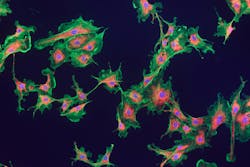Older people may be at greater risk of developing pancreatic cancer and have poorer prognoses because of age-related changes in cells in the pancreas called fibroblasts, according to research led by investigators from the Johns Hopkins Kimmel Cancer Center, the Johns Hopkins Bloomberg School of Public Health and the Bloomberg~Kimmel Institute for Cancer Immunotherapy.
The study, published online February 8 in Cancer Research, provides clues as to why pancreatic cancer is more common and aggressive in older people. It may also help scientists develop new therapeutic approaches for this difficult-to-treat cancer. The study showed that aging alters fibroblasts in ways that enable them to promote pancreatic cancer tumor growth.
Daniel Zabransky, M.D., Ph.D., and his colleagues compared samples of pancreatic fibroblasts from patients older than 55 with pancreatic fibroblasts from patients younger than 35. They discovered that the cells from older patients behave very differently than younger ones. To find out why, they compared the proteins released by the younger and older cells and noted profound differences.
They determined that a critical change in older pancreatic fibroblasts is that they release more of a protein called growth/differentiation factor 15 (GDF-15).
Experiments in human cells revealed that GDF-15 activates the AKT signaling pathway in an age-dependent manner.

